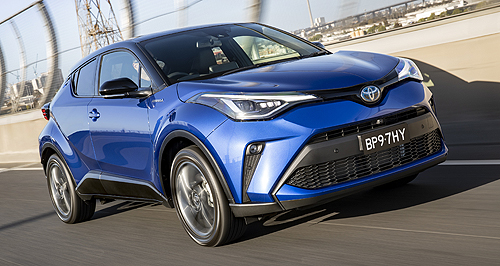Driven: Toyota C-HR ushers in hybrid power

TOYOTA Australia says it is not chasing segment leadership with its updated C-HR small SUV, which ushers in hybrid technology for the first time to become the eighth model in the dominant Japanese brand’s line-up to feature the fuel-saving technology.
Kicking off from $29,540 plus on-road costs for the C-HR 2WD petrol, point of entry to the updated range has increased by $2550 with the removal of the entry-level manual grade, while the new top-spec Koba hybrid sits $1150 upstream of the previous Koba AWD petrol range-topper at $36,440.
Both 2WD and AWD C-HR petrol grades have increased in price by $550 with the update, while the equivalent Koba variants have risen $650.
In 2018, C-HR’s first full year on sale, Toyota recorded 9716 sales – a healthy figure but well off the pace of leaders in the category such as the Mitsubishi ASX (19,034), Mazda CX-3 (16,293) and Nissan Qashqai (13,950).
Speaking to GoAuto at the launch of the updated C-HR last week, Toyota Australia vice-president of sales and marketing Sean Hanley said the company was not chasing segment leadership, due in part to the brand only offering a two-variant range.
“We don’t have the breadth of model range that other (competitors) have, so when you look at it relatively speaking, C-HR is doing very well in the market, it’s doing exactly what we expected it to do, it’s probably brought in significant incremental sales to our brand, new customers to our brand,” he said.
“I think when we launch the hybrid, that will add another dimension of excitement to that car.
“But I think you’ve got to look at our grade offering compared to competitors, and you look at that and take the relativity of our volume, C-HR is doing very well.”
The C-HR joins the RAV4, Camry, Corolla hatch/sedan and Prius, Prius V and Prius C as hybrid offerings in Toyota’s line-up, and commands a $2500 premium over the equivalent 2WD petrol Koba.
The C-HR’s hybrid powertrain teams a 1.8-litre Atkinson-cycle four-cylinder petrol engine producing 74kW/142Nm, paired to a 53kW/162Nm electric motor for a combined output of 90kW.
Combined-cycle fuel consumption for the hybrid is rated at 4.3 litres per 100km, while CO2 emissions come in at 97 grams per kilometre.
All-wheel drive is not offered with the hybrid, and the new variant is only available in the top-spec Koba grade.
Other versions carry over unchanged with a 1.2-litre turbo-petrol four-cylinder engine producing 85kW/185Nm, driving either the front or all four wheels via a continuously variable transmission (CVT).
Fuel consumption for petrol variants range from 6.4-6.5L/100km depending on 2WD or AWD, while emissions are 144-148g/km.
Along with the hybrid introduction, other key enhancements to the C-HR range include the fitment of an 8.0-inch touchscreen with Toyota’s latest-generation multimedia system, which sports Apple CarPlay and Android Auto compatibility.
This supersedes the 6.1-inch unit on pre-facelift versions.
Light styling updates have also been applied to the C-HR including LED headlights and tail-lights, and fresh alloy wheel designs measuring 17 inches for the C-HR and 18 inches in the Koba. A new paint colour – red mica metallic – has also been added to the palette.
Standard equipment at the entry level includes heated/folding exterior mirrors, fabric upholstery, a 4.2-inch instrument cluster display, leather-wrapped steering wheel, electrochromatic rearview mirror, dual-zone climate control, automatic windscreen wipers, satellite navigation, six-speaker audio system and an electronic park brake.
Safety features extend to autonomous emergency braking with day and night pedestrian detection, adaptive cruise control, lane-departure warning with lane-keep assistance, automatic high beam, blind-spot monitoring with rear cross-traffic assist, front and rear parking sensors and seven airbags.
Stepping up to the Koba adds privacy glass, leather-accented upholstery, heated front seats with power lumbar support for the driver, smart entry/start and a surround-view monitor.
TMCA expects nearly 50 per cent of C-HR buyers to opt for the Koba grade, which could end up as more than half depending on the popularity of the hybrid powertrain, which itself is predicted to represent around 30 per cent of overall volume.
Two options are available on the C-HR, including premium paint for $550, and two-tone paint for Koba grades which asks $450.
Like other Toyota offerings, the C-HR comes with a five-year/unlimited-kilometre warranty, while five years of annual capped-price servicing costs $195 per visit.
To the end of October, Toyota had recorded 7958 sales of the C-HR, which is down 1.5 per cent over the same period last year but represents a 0.1 per cent increase in segment share, to 7.8 per cent.
Its 7958 sales place it seventh in the competitive segment, behind the Mitsubishi ASX (17,688), Mazda CX-3 (12,671), Hyundai Kona (11,114), Honda HR-V (9968), Nissan Qashqai (9943) and Subaru XV (8594).
2019 Toyota C-HR pricing*
| C-HR 2WD petrol (a) | $29,540 |
| C-HR AWD petrol (a) | $31,540 |
| Koba 2WD petrol (a) | $33,940 |
| Koba AWD petrol (a) | $35,940 |
| Koba 2WD hybrid (a) | $36,440 |
*Excludes on-road costs